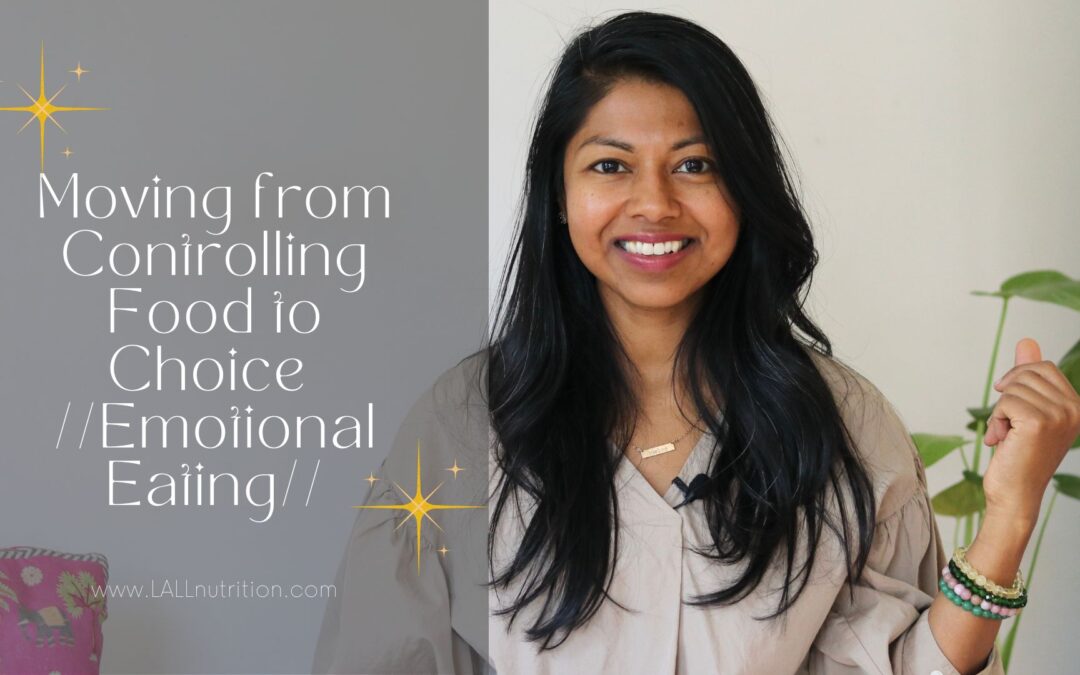Hello love,
Today I want to share with you how you can move from being at the mercy of food and craving it to having a more balanced approach to food and actually desiring food as an emotional eater.
I wanted to share this discernment and how we can move from an obsessive way with food towards just feeling good around food. This is something that my clients want to achieve. They feel so out of control with food like they’re just constantly obsessing and using all of their brain power thinking about food.
They want to just have that relationship to food that feels good. Of course, as an emotional eater, this can be difficult, and especially if we have a diet mentality. All of that obsessing about food has become a pastime for us.
I totally get it.
When I was on my emotional eating journey, all I thought about was food, the next meal, counting calories, is this good? There were just so many questions around food.
It’s debilitating and it makes you feel like you have no choice.
Craving vs. Choice
When we are craving food and we’re obsessing about it, we feel like we’re out of control, like something is pulling us and taking us away from ourselves. Whereas, when we feel good around food, we have choice and we can choose what to eat, we can choose to indulge. We have more autonomy. We don’t feel like we’re out of control. This is what we’re desiring, choice. Because we can feel in ourselves if something else is driving or taking us over, it feels uncomfortable.
So how do we get from point A to point B? This is something that I guide clients through. Of course, this is a process and it has multiple layers. It is possible to feel good around food, to not obsess about every meal, to actually feel your true hunger in your body, and then eat and not be thinking about food from the minute you wake up to when you go to bed.
We work through this and get to where we’re feeling good around food.
I had one client describe it as that French relationship with food, where you have an amazing meal, you indulge and then you can let it go. You don’t obsess about it after, you enjoy the meal and you feel good.
I’m going to guide you through the three areas that I guide my clients through to help them release their obsession with food below:
1. Nourishment vs. Restriction
The first area is all around nourishment or lack of nourishment. When we are emotional eaters, we tend to also have a diet mentality. To be honest, our society is created around these diet rules. “Don’t eat so much, eat this many calories, etc”. There’s a lot of old thinking around food.
We don’t really understand food on a deeper level. So with this diet mentality, what happens is that we are constantly restricting food. We’re not nourishing ourselves enough throughout the day. This leads us into more obsessive thoughts about food because we are physiologically not meeting the needs of our body.
We need a certain amount of nutrients and calories, etc for our body to function and to not trigger obsession.
If we’re restricting we obsess about food. Especially if at the back of our head, we feel like we have to lose weight or restrict our calories. We have this “goal” and we’re going against our system and it’s screaming at us to eat.
That’s one way we create binging because we haven’t been nourishing ourselves. When we eat, we’re going to want to gorge and we’re going to want to go towards all of these foods and just eat a large amount. So this is how we can create that obsession around food.
Of course, once we start nourishing our body throughout the day and we’re meeting those needs, it eliminates a lot of these obsessive thoughts. So we feel more balanced. We’re not thinking about food as much because we don’t need to, we don’t have to, our biology is not telling us to.
So we eliminate this one layer of these obsessive thoughts around food through nourishment. This doesn’t mean we’ve solved our emotional eating though.
There are other layers.
2. Body
If we look at the next layer we need to move through it is around the body.
For example, if we are pushing the limits of our body, over exercising, not getting enough rest, not getting the right type of movement, etc we imbalance our body. This imbalances our hormones which can trigger more hunger and binge eating.
If we’re not resting enough, we creating an imbalance in our hunger hormones. This means we’re going to crave more food because we haven’t gotten adequate rest. Even if you’ve slept 10 hours, it’s more the quality of your sleep that matters.
Working backwards, we could see what’s triggering more hunger in our body maybe it’s getting more rest or better movement etc. This is a way we can reduce that obsession with food. Because in this example our body is using food to make up for the lack of energy we have.
When we mitigate the triggers around what our body needs, we’ll eliminate any excessive or imbalanced hunger cues.
3. The Emotional Eating Pattern
The third area that’s going to be important with eliminating this obsession around food is around the emotional eating pattern. Which is when we use food to soothe ourselves from any discomfort or stress in our day.
To be honest with you, the first two layers that I mentioned with restricting our food and with the way we’re treating our body, creates a mood imbalance from physical triggers, which then triggers the emotional eating pattern.
But here in this 3rd area, I’m talking about those unresolved emotions and events in our lives. The little to big traumas (unresolved events) in our lives that are being triggered. When they come up, we go to food to soothe because we don’t know how to deal with that discomfort.
So that’s a bit of nuance with the triggers.
Here the obsession about food is a bandaid to not feel certain emotions and instead to soothe/distract ourselves.
This “jump” can be very instant. This is where we might feel the most out of control because we’re just watching ourselves spiral into this emotional eating episode and not realize what’s going on.
To move through this we turn towards ourselves and move through the emotions. We create resolution and are able to move forward much more powerfully because we find out what our true needs are.
We stop using food to soothe and meet our true needs. Because in the past every time we were triggered into that situation, we went towards food. But if we resolve it at the root we create a new way of moving forward. We give ourselves what we truly needed.
Emotional eating is a coping mechanism, it’s a band aid. It’s not a true solution.
When we get to the root and meet our true needs, we no longer need food to soothe.
It kind of goes *poof* (of course this timing depends on you personally)
Part of the reason we think about the food is it distracts us from what’s going on under the surface. But when we really turn towards ourself, we won’t need to think about food.
This is how we move away from obsessing about food. Food will then take its natural place in our life of nourishing us.
Yes, food feels good. It’s pleasurable, but not the craving and agitation kind of pleasure we’ve been using it for.
Summary
When we start resolving the areas I mentioned above, we naturally start feeling good around food + in our body. We make better choices for the way we’re nourishing ourselves, better choices about our body, and move through what’s going on under the surface, those emotions.
We start feeling at ease, free and confident in our body and around food.
What i’ve shared above is the process that we work through with clients inside of The Emotional Eating Evolution Program, my step by step methodology with lots of support, guidance and meditations to work through this pattern.
If you’re ready to resolve your emotional eating, I’d love to invite you to apply + book in an Emotional Eating assessment call here. On the call we find out more about you, your goals and how we can support you in the program.
To feeling at ease around food,
Michelle
Certified Holistic Nutritionist + Emotional Eating Expert
.


